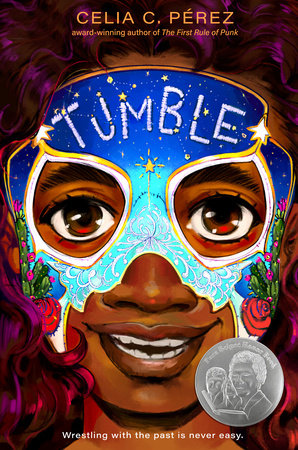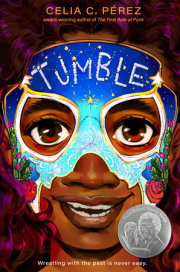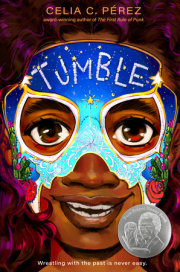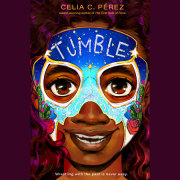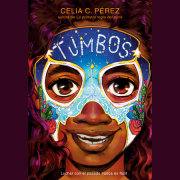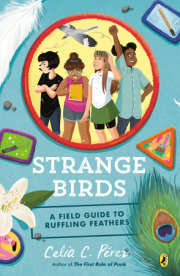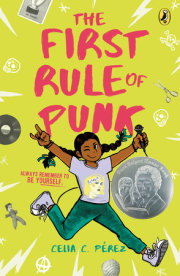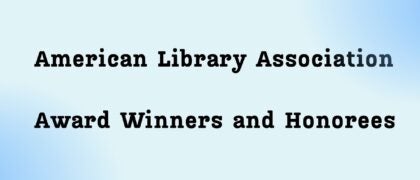Chapter 1
I bit into a french fry, one of those tiny crunchy pieces that always make their way to the bottom of the pile, just as Apollo slammed a folding chair across The Eagle’s back. The small TV on the shelf behind the counter was muted, and while I couldn’t hear the whack of metal against muscle, it startled me anyway. I flinched and jabbed myself with a shard of potato so hard that my eyes watered.
“Uyyyy,” Alex said. He peered up at the TV from the flat-top grill and let out a slow whistle. “El Águila is getting his butt kicked again, eh, Adelita?”
“Yeah,” I said. I ran my tongue over the fresh cut on the roof of my mouth. “Again.”
“Maybe he’ll win this one, right?” Alex winked at me and cracked an egg into a bowl.
I watched as he attacked the egg with a fork. Alex said the key to making a good scrambled egg was to keep the heat low and to beat the egg before pouring it into the pan. In general, I found the idea of eating eggs gross, but even I had to admit that Alex made a fine scrambled egg. Still, when he caught my eye and motioned to the runny glob he was cooking, I shook my head.
Bacon grease popped and snapped on the grill as Apollo smacked the palm of his hand across The Eagle’s chest. A sizzle and the scrape of a spatula accompanied The Eagle bouncing off the ropes, zipping across the ring, and attempting a failed clothesline. My insides jumped as if the mat, which vibrated with each impact, were sitting in the middle of my stomach.
On-screen, The Eagle showed no signs of winning this one. He struggled to get up, only to be met with the toe of Apollo’s golden boot. He didn’t stand a chance.
“Why does The Eagle always have to lose?” I asked.
“Because he’s a jobber,” Alex said, not looking up from the grill.
“What’s a jobber?”
“A jobber puts over the other wrestler,” Alex explained as The Eagle tried to untangle himself from the ropes.
“Plain English, please.”
“It means his job is to lose and make the other guy look good,” Alex said. “He’s not a heel nor a face. Not a bad guy and not a good guy. Just—”
“—a jobber,” I finished.
Unlike Apollo, who was definitely the good guy. He’s the one you’re supposed to want to win. But Apollo had enough people cheering for him already, so I found myself going for the masked luchador. Mom says someone has to root for the underdog. That someone is me.
While The Eagle slowly got up and rolled back into the ring, Apollo climbed to the top turnbuckle and waited like he was the bird of prey. I knew what was coming next. Wrestling might look like chaos, just a couple of people brawling, but it’s a ballet. And anyone who was a fan would know that the final curtain was about to drop.
Sure enough, when The Eagle stood and turned, Apollo pushed off like his boots had springs, flying through the air in his signature closing move, the Sunset.
“And that’s liiiiights OUT!” Alex yelled, just like the ringside announcer did every time Apollo finished off an opponent. He slashed his spatula through the air for dramatic effect.
“Hey,” I said with a frown. “Whose side are you on anyway?”
“Yours, Adelita.” He pointed at me with the spatula. “Always.”
I rolled my eyes. Alex was my stepfather. He was supposed to say mushy stuff like that.
Alex lifted his Albuquerque Isotopes baseball cap, revealing the shiny bald spot that had expanded over the years, the area of hair on his head shrinking like a polar glacier. He wiped his forehead with the back of his hand before pulling the cap on.
“Order up!” he yelled, smashing the bell on the counter.
On the TV screen, The Eagle lay motionless in the ring. Get up get up get up. I thought the words so hard, I was giving myself a headache.
The referee dropped down next to the wrestlers and started the count.
“One!” He slapped his hand against the mat.
Get up.
“Two!” The crowd was counting along with him now.
Get. Up.
“Three!”
The bell rang, signaling the end of the match. Apollo stood and pumped his fists in victory while the audience cheered and whistled in appreciation.
In the grainy image, I could see The Eagle’s belly rise and fall with each heavy breath, like a ball of unbaked dough. He rolled over on his side, and the camera zoomed in on him. His spotted gold-and-brown mask was slightly twisted. Something about the way the mouth and eye holes didn’t line up with his face made me feel sad for him. He looked like a helpless little kid who needed an adult to fix his costume. I wanted to reach through the TV and straighten him out.
I slumped on my stool, feeling like I’d lost too. I looked away from the screen and pushed my fries around on the plate, making a french fry face on what was left of my pancake syrup.
The door to the kitchen swung open, and Mom came out of the back, pulling her curly dark hair up into a messy ponytail. Her T-shirt rose a bit, exposing her stomach, the tight skin like a big brown balloon ready to pop.
“Mom,” I whispered.
“What?” she whispered back.
I widened my eyes in the direction of her midsection.
“Oh.” She laughed and pulled down on her shirt. “I thought I felt a draft.”
“Not funny,” I said.
“Ay ay ay.” Mom groaned and made a face at the TV, where The Pounding Fathers rode in on horseback while “The Star-Spangled Banner” played. “They could at least be historically accurate,” she said. “The Founding Fathers came before ‘The Star-Spangled Banner.’”
“It’s not supposed to be historically accurate,” I said. “They’re zombies.”
“And the zombies come after the apocalypse,” Alex added. “Everyone knows that.”
Mom and I looked at each other and shook our heads.
“Does this have to be on all the time?” Mom asked, reaching across the counter and switching off the TV.
“It does,” Alex said. “This is wrasslin’ country, lady.”
And it was. Roswell had its aliens. Albuquerque had its hot-air balloons. We had wrestling. Lots of people came into Esperanza, one town over, for Cactus Wrestling League matches at the arena. The diner stayed open later on the weekends to feed hungry fans after the matches. The menu was even separated into two sections: The Undercard—breakfast and lunch—and The Main Event, which was dinner, of course.
Alex had grown up a wrestling fan. The wall across from the counter was decorated with lucha libre masks he picked up at events in Esperanza and on trips to Mexico. His old wrestling action figures sat on the shelves behind the counter, flexing their muscles between big jars of homemade salsa and pickled peppers and plastic tubs of spices. His most prized possession was a signed and framed black-and-white photo of André the Giant that was propped up on a shelf above the flat top. Next to it was a color photo of Alex as a little boy standing next to the seven-foot-four wrestler, who had visited the diner after an event in Esperanza. On the other side of the signed photo was an André the Giant action figure. The whole thing was a shrine to his favorite wrestler.
It was hard not to be a wrestling fan in the Dos Pueblos area—the neighboring towns of Thorne, where we live, and Esperanza, where Cactus Wrestling happens. I wasn’t a fanatic like Alex, but I liked the characters and the costumes and the stories. Wrestling was a lot like mythology, and I loved mythology.
“It’s too early for body slams,” Mom said. Mom was definitely not a fan. “And it’s giving me indigestion.”
“You sure it isn’t you-know-who?” I pointed to her pregnant belly.
“That’s possible,” Mom said. She looked at my plate. “Speaking of indigestion, the last time I checked, french fries were not a breakfast food.”
“Says who?” I asked.
“I tried to give her some hope,” Marlene called over from the table she was wiping off. She laughed at her own joke.
There were a lot of things about the Four Sisters Diner that hadn’t changed since Alex’s grandfather opened it in 1963. Marlene Rosado was one of them. Marlene was the closest thing I had to a grandma. She was tiny and ancient, with a cap of tight black curls that made her look like she wore a blackberry on her head. Despite her age, she moved around quicker than most of the younger servers. She always said that when she stopped moving, she’d know it was time for her to go. “And by go, I mean GO,” she’d say, and look down toward the ground in case people weren’t sure what she meant.
Marlene liked to holler out orders in diner lingo. She said things like “moo and wrap” for beef enchiladas and “don’t cry over it” for no onions. She said diner lingo was a dying language.
“These young people today speak in mojitos,” she said one day.
I told her the word was emojis.
“Mojitos, emojis, whatever it is, there’s no poetry in it,” Marlene complained.
Anyway, hope is diner lingo for oatmeal, which is funny because oatmeal seems about as hopeless a breakfast as I can imagine.
“Oatmeal is cringe,” I said. Even more than eggs. “Besides, french fries are practically hash browns. And I had a piece of French toast too.”
“Ooh la la.” Alex twisted an imaginary mustache. “French fries and French toast. Oui, oui, mademoiselle.”
“You are reaching dangerous levels of corniness,” Mom said, but she laughed anyway as she bent down to pull something from behind the counter.
“Look what I remembered.” She placed a white poster board in front of me. “What are you doing with this again?”
“I told you already,” I said. “Like, three times.”
“Fourth time?” Mom gave me an apologetic look. “Please?”
“It’s for the mythology assignment,” Alex said, walking to our end of the counter while Carlos took over the flat top.
“See? He remembers.”
“And what’s that supposed to mean?” Alex pouted.
I didn’t say anything, but what it meant was that stepfathers don’t have to remember.
“I knew that.” Mom tapped her forehead.
Between getting ready for the baby and helping with the diner and her real job at the museum, Mom said she didn’t have room for one more thing in her brain. That one more thing was me, I guess. She said it was good that I was old enough to take care of a lot on my own. I thought it was pretty convenient how I was old enough to handle the stuff she couldn’t remember or make time for but not old enough for everything else.
“Your mom has a lot on her plate right now,” Alex said. He looked at his watch. “Don’t leave. Let me grab your lunches.”
Mom came out from behind the counter and put an arm around my shoulder. She gave me a little squeeze. Mom wasn’t a hugger, and awkward hugs from Mom usually meant one thing.
“How are you feeling?” she asked, tucking a strand of hair behind her ear.
Mom wasn’t very good at showing her feelings. I think expressing herself made her uncomfortable, like I feel when I see people kiss in movies.
“I’m fine,” I said, shimmying out from under her arm.
Alex came out of the kitchen with two brown paper bags that he set on the counter in front of us.
“Sardine-and-horseradish sandwiches.” He let out a maniacal laugh and went back to the flat top.
Mom and I both scrunched up our faces.
“You’re always fine,” Mom said with a sigh. “I wish you would tell me how you’re feeling. You’re just like me.”
“Why do you always do that?” I asked, opening my lunch bag and sniffing. Just in case.
“Do what?”
“‘Just like me,’” I mimicked and sighed. “Who else would I be like?”
The question wedged itself between us like when we have to squeeze three people into one seat on the school bus for field trips.
“We haven’t really talked about the adoption,” Mom said. She looked at me and then over at Alex.
We have these old ornaments that we put up on the diner’s Christmas tree every year. The glass is so thin that they shatter easily, and then they’re impossible to clean up—little flecks everywhere. Sometimes, talking with Mom felt like putting up those decorations. Each word, each feeling, was a delicate glass ornament that could break if it wasn’t handled carefully. The adoption was one glass ornament. My biological father was another. Sometimes it was just easier to not talk.
“I’m fine,” I said again. I took a sip of milk. The raw spot on the roof of my mouth hurt. “And I have to go to school. Unless . . .”
“No unless,” Mom said. “We’ll talk later.” But she seemed relieved to not have to continue her attempt at a conversation. “Don’t forget this.”
She nudged the poster board toward me, then tugged on her shirt again before collecting my plate. When she turned away to scrape the french fry face into the trash, I grabbed my lunch bag and the poster board and hopped off the stool so fast, I almost tripped on my own feet.
I pushed open the diner door with my sneaker, ignoring Alex’s Enjoy your sardines and horseradish, ignoring Mom’s Have a good day, ignoring Marlene’s wave at the window. I threw the brown bag in my bike basket and pedaled away.
Copyright © 2022 by Celia C. Pérez. All rights reserved. No part of this excerpt may be reproduced or reprinted without permission in writing from the publisher.

